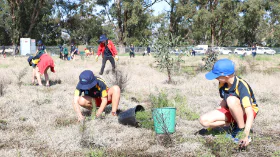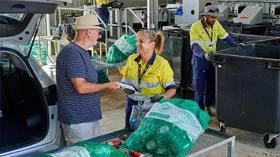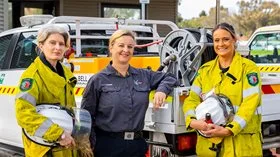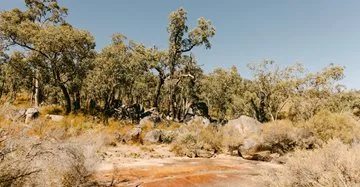Our natural environment, including bushland, open spaces, the Swan Valley and the Swan River, is extremely important us.
We are working hard to achieve preserve our environment through seven of our services: emergency management, natural area management, park and reserve maintenance, recycling centres, sustainable environment, waste collection and robust education.
Our community is happy with our progress, with 84 per cent of surveyed residents satisfied with our management of natural reserves.
To keep us on track and accountable to our goals, we outlined our objectives in our Strategic Community Plan; and our natural environment focus areas in our Sustainable Environment Strategy.
The Natural Environment key result area (KRA) covers three main outcomes:
- Protecting our natural ecosystems
- Minimising waste to landfill
- Protecting natural resources for future generations.
Protecting our natural ecosystems

We have been working diligently through a range of initiatives to reduce our impact on the environment, and with the help of our community, we have made significant headway.
We are lowering our greenhouse gas emissions, conserving water, increasing tree canopy and protecting biodiversity.
Trees
In the past year, we have planted over 2,000 street trees across the City.
Our Free Trees and Plants Giveaway was a hit with our community, with 45,600 community plant allocations.
In November 2024, we were awarded a commendation for our Tree Management and Protection Approach in the Climate Change and Resilience category at the PIA awards.
We also celebrated 10 years of our Thinking Green program, a free community sustainable living workshop series. In 2023/24 we provided 40 free workshops for 745 people.
Water
The City has maintained a perfect score of 100 per cent three years running on its SERCUL Nutrient Management Scorecard. This means we have excelled in nutrient monitoring, management and education.
We continue to prioritise foreshore rehabilitation with a view to improve water quality. We planted 1,759 seedlings at Bennett Brook and also managed water quality with feral fish removal research and planning.
| SCP Objectives | SCP Measure | Target | How we are tracking |
|---|---|---|---|
| N1.1 Enhance, preserve and protect local ecology and biodiversity of natural ecosystems N1.3 Protect our green environment |
Tree canopy coverage | One per cent growth from baseline per annum in urban street trees planted | 1.5 per cent increase in 2025 1.5 per cent increase in 2024 |
| N1.1 Enhance, preserve and protect local ecology and biodiversity of natural ecosystems N1.3 Protect our green environment |
Per cent of community satisfied with management of City of Swan nature reserves | Maintain or increase the two-year rolling average (baseline 72 per cent) | 84 per cent in 2024 78 per cent in 2023 |
Water
| SCP Objectives | SCP Measure | Target | How we are tracking |
|---|---|---|---|
| N1.2 Preserve our waterways | SERCUL Nutrient Management Scorecard | Maintain an overall score of at least 80 per cent | 100 per cent in 2023 calendar year 100 per cent in 2022 calendar year |
| N1.2 Preserve our waterways | Nutrient levels of monitored perennial water courses | Reduce excess nutrients in Bennett Brook | Nitrogen decreased seven per cent, phosphorous decreased four per cent* in 2024 Nitrogen increased 2.1 per cent, phosphorous decreased 1.6 per cent* in 2023 |
In 2026, we'll give away saplings to our urban and rural residents as part of our Free Trees and Plants Giveaway. We will also deliver a range of sustainability and environmental workshops as part of the WA Tree Festival to help educate our community on protecting our natural environment.
Minimising waste to landfill

The City aims to reduce our volume of waste through reduction, re-use and recycling waste products to ensure we provide the cleanest environment possible for our community and natural assets. We have outlined our goals in our Waste Management Plan, which lists education among staff and our community as one of the key actions in achieving our goals.
While we already have a range of programs in place to help our community and staff divert waste from landfill, in 2025 we plan to meet our goal of 60 per cent diversion.
We have begun the three-bin kerbside collection system, including a Food Organics and Garden Organics (FOGO) service, which will turn organic waste into compost or soil conditioner.
Our goal is 90 per cent diversion, which we can achieve once the East Rockingham Waste to Energy is completed at the end of 2025.
We also continue a range of community initiatives such as the reusable cloth nappy program and worm farm subsidy.
| SCP Objective | SCP Measure | Target | How we are tracking |
|---|---|---|---|
| N2.1 Minimise waste to landfill | Per cent recycling versus landfill | Achieve 60 per cent waste diversion by 2025 | 29.79 per cent in 2024 31.22 per cent in 2023 |
Recycling recovery
- 75.3 per cent from Recycling Centre – Bullsbrook
- 65.1 per cent from Recycling Centre – Malaga
- 39.4 per cent from pre-booked verge collections
- 17.1 per cent from kerbside collection.
- 787kg of textiles diverted from landfill through staff clothes swaps
- 254kg of City uniforms
- 4.5 million containers through the Container Deposit Scheme.
The FOGO rollout is on pause while we consult the community about how you'd like to see your kerbside waste collection service work.
We intend to send landfill materials to the East Rockingham Waste to Energy from the end of 2025 to be turned into renewable energy.
Protecting natural resources for future generations

The City is one of the fastest growing local governments, with a population estimated to reach almost 300,000 by 2051. We have many actions in place now to ensure a sustainable natural environment so our future generations can thrive.
Water
The City is accredited as a Gold level Waterwise Council and all our leisure centres are Waterwise accredited. We have used 90 per cent of our allocated limit from The Department of Water and Environmental Regulation.
City carbon emissions
We are leading by example in the efficient use of energy, renewable energy and alternative modes of transport.
Our action plan aims to reduce and/or offset emissions to reach net zero emissions by 2050.
To help us achieve this, we committed to buying 100 per cent of contestable energy from renewable energy sources in 2022. We also increased the number of hybrid vehicles in our fleet and began replacing our streetlights with LEDs.
Risk reduction
By reducing bushfire risk, we can protect our community and our natural environment.
We work to do this through our firebreak and risk reduction efforts, private property inspections, enforcement of fire reduction notices, risk management plans for major reserves and more.
| SCP Objective | SCP Measure | Target | How we are tracking |
|---|---|---|---|
| N2.2 Protect our natural resources for future generations | City carbon emissions | Net zero emissions by 2050 Baseline set at 19,875 tCO2e |
14,698 tCO2e in 2024 15,330 tCO2e in 2023 |
| N2.2 Protect our natural resources for future generations | City water consumption (potable) | Baseline set at 129,146 kL | 137,168 kL in 2024 143,584 kL in 2023 |
| N2.2 Protect our natural resources for future generations | City water consumption (non-potable) | Comply with DWER annual water licence (80 per cent of allocation) | 90 per cent allocation used in 2024 80 per cent allocation used in 2023 |
During 2025, we are updating our Bushfire Risk Management Plan and system.

